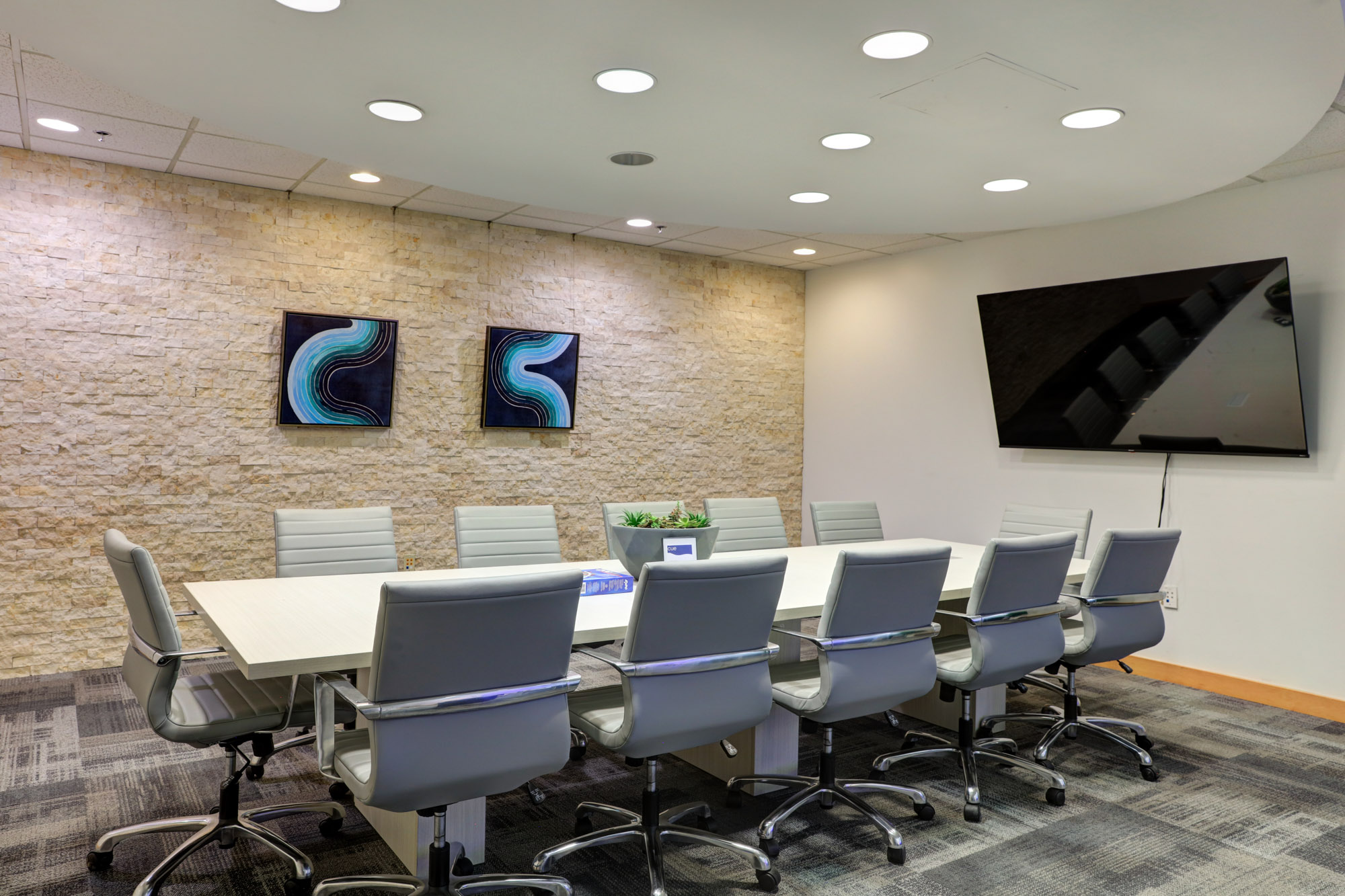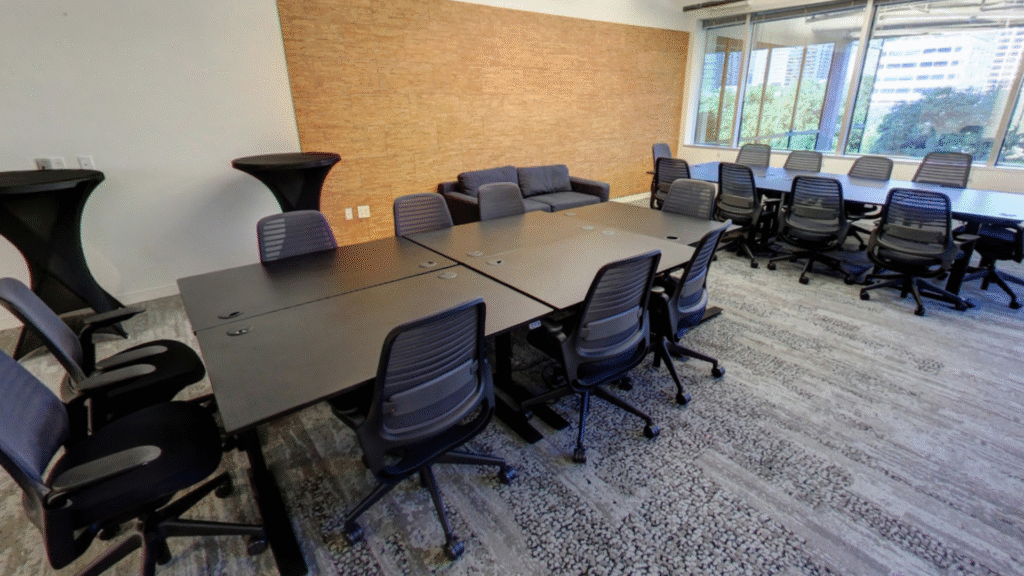
Selecting the ideal office space is a pivotal decision that can significantly influence your business’s productivity, employee satisfaction, and overall success. Whether you’re a startup, freelancer, or established company, the right workspace fosters collaboration, creativity, and growth. This guide will walk you through essential considerations to help you find an office space that aligns with your goals and operational needs.
Table of Contents
Tips for Choosing a Perfect Office Space
Securing the right business office space goes beyond just location or budget—it’s about creating a setting that empowers your team, reflects your brand, and supports your long-term goals. Whether you’re establishing a new headquarters or relocating, the following strategic tips will help you navigate your options and make confident choices about office space layout, infrastructure, and flexibility.
1. Identify Your Needs
Understanding your business’s unique requirements is the foundation of choosing the perfect office space.
- Team Size and Growth Projections: Assess your current team size and anticipate future expansion. Opt for spaces that offer flexibility to scale as your team grows.
- Nature of Your Business: Consider the specific needs of your industry. For instance, creative teams might benefit from open spaces that encourage collaboration, while tech companies may require high-speed internet and private meeting rooms.
- Specialized Infrastructure: Identify any specialized infrastructure or amenities you may need, such as advanced AV systems, quiet zones for focused work, or high-speed internet connectivity.
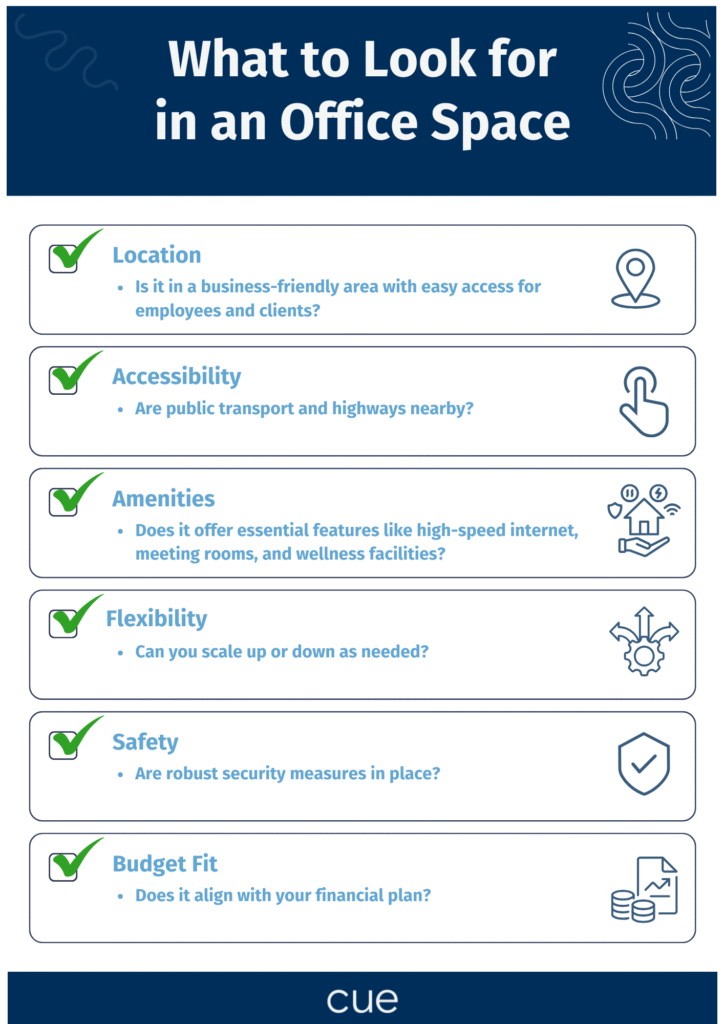
2. Location Matters
The location of your office space plays a crucial role in accessibility, brand perception, and employee satisfaction.
- Accessibility: Choose a location that is easily accessible by public transportation and major highways to facilitate commutes for employees and clients.
- Surrounding Amenities: A vibrant neighborhood with restaurants, cafes, and retail stores can enhance the work-life balance for your team and make your office more appealing to clients.
- Proximity to Clients and Partners: Being close to your clients or business partners can improve collaboration and reduce travel time. If your client base is concentrated in or around Dallas, a centrally located office boosts accessibility and presence.
3. Budget and Affordability
Balancing cost with quality is essential when selecting an office space.
- Set a Realistic Budget: Determine your budget for rent, utilities, and setup costs. Consider both short-term expenses and long-term financial commitments.
- All-Inclusive Amenities: Some office spaces offer packages that include utilities, internet, and maintenance, which can simplify budgeting and reduce unexpected costs.
- Long-Term Savings: Flexible lease terms can provide financial flexibility, especially for startups and growing businesses.
4. Space Layout and Design
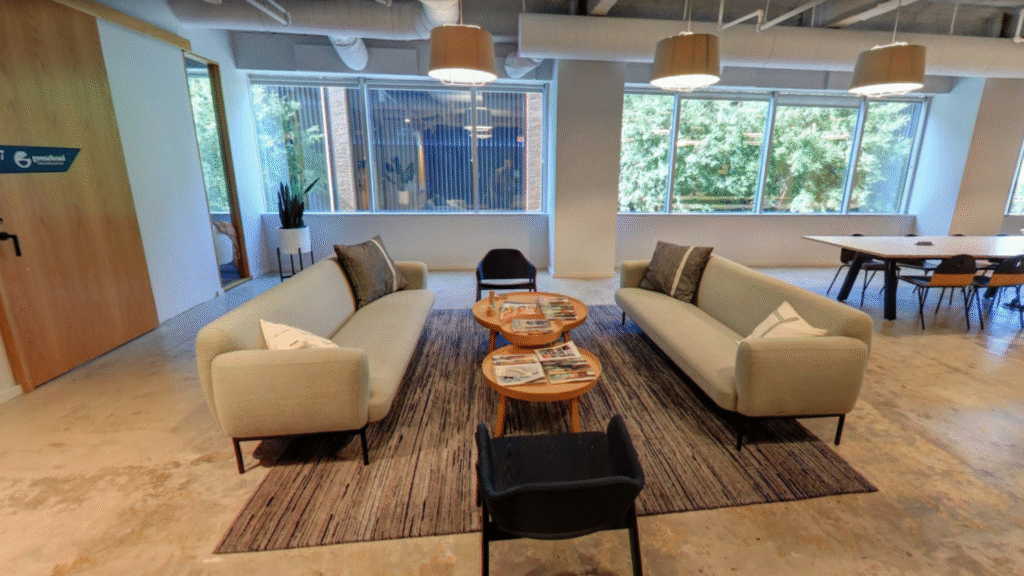
A well-designed office can boost productivity and reflect your company’s culture.
- Flexible Layouts: Look for flexible office spaces that offer customizable layouts, allowing you to adapt the workspace to your team’s needs.
- Office Size: Ensure the space comfortably accommodates your team and allows for future growth. This is especially important in growth-heavy cities like Dallas, where office configurations can vary drastically by district.
- Brand Alignment: The aesthetics of your office should align with your brand identity, creating a cohesive experience for clients and employees.
5. Lease Terms and Flexibility
Understanding lease terms is vital to ensure they align with your business’s flexibility needs.
- Short-Term Options: If your business is in a growth phase, consider spaces that offer short-term leases or month-to-month agreements.
- Scalability: Choose office spaces that allow you to scale up or down easily as your business evolves.
- Clear Terms: Review lease agreements carefully to understand responsibilities for maintenance, repairs, and any additional fees.
6. Amenities and Infrastructure
Top-tier amenities can enhance the workplace experience and support your team’s productivity.
- High-Tech Infrastructure: Ensure the office provides reliable high-speed internet, AV-equipped meeting rooms, and necessary IT support.
- Wellness Amenities: Features like ergonomic furniture, quiet lounges, and natural lighting contribute to employee well-being.
- Community Perks: Access to networking events, workshops, and community workspaces can foster a collaborative environment. In some premium coworking hubs, The Cue for innovation often comes from these very spaces, where shared energy and spontaneous conversations drive breakthrough ideas.
7. Accessibility and Parking
Convenient access and parking are critical for both employees and clients.
- Public Transport: Proximity to bus stops, train stations, or other public transportation options can ease commutes.
- Parking Facilities: Availability of on-site or nearby parking is essential, especially in areas with limited public transport.
- Wheelchair Accessibility: Ensure the office space is ADA-compliant, providing inclusivity for all team members and visitors.
8. Safety and Security
A secure workplace builds trust and peace of mind.
- 24/7 Security: Look for office spaces with round-the-clock security measures, including CCTV and access control systems.
- Emergency Preparedness: Ensure the office has clear safety protocols and trained staff to handle emergencies.
- Well-Lit Spaces: Adequate lighting contributes to a safe and welcoming environment.
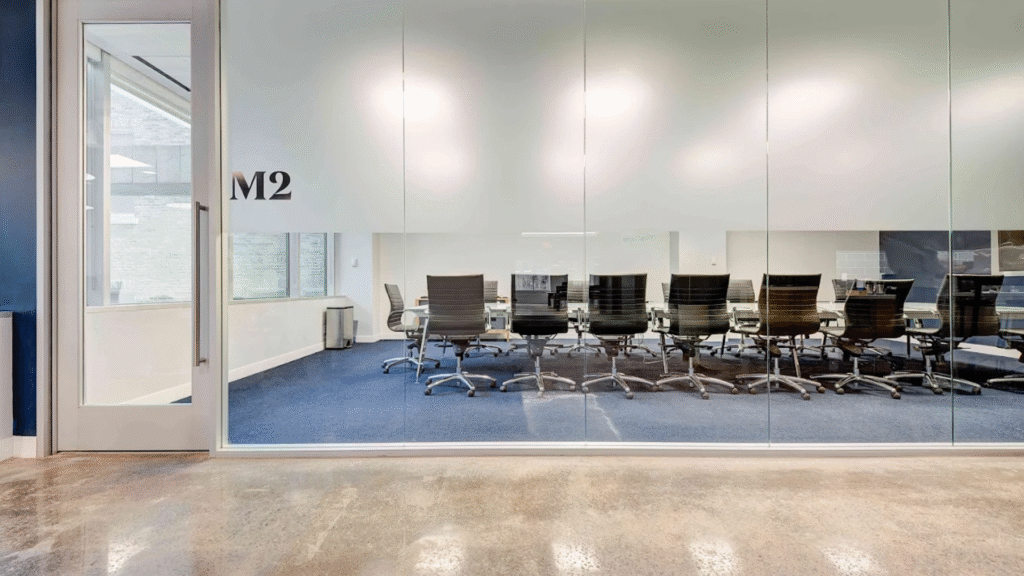
Common Mistakes to Avoid When Leasing Office Space
Leasing office space is an important decision, and avoiding a few key missteps can ensure a smooth and successful experience. Keep these tips in mind:
Understand the Lease Terms Fully
Take the time to carefully review the lease agreement, especially key details like rent escalation, maintenance responsibilities, and renewal clauses. This helps you align the lease with your long-term business goals.
Consider All Costs Involved
Look beyond the base rent. Account for additional expenses like utilities, parking, and maintenance fees. Knowing the complete financial picture lets you budget effectively and avoid unexpected costs.
Choose a Space That Supports Future Growth
Opt for an office that not only fits your current team but also allows for seamless expansion. Look for features like open floor plans, scalable tech infrastructure, and lease flexibility. In a city like Dallas, where the business ecosystem is rapidly growing, choosing a space with future growth in mind positions your company to scale alongside the market and avoid costly relocations.
Prioritize a Convenient Location
When selecting your office, Dallas stands out as a strategic hub thanks to its central U.S. location, thriving economy, and well-connected transportation network. Easy access to highways, airports, and public transit makes commuting efficient for employees and meetings hassle-free for clients.
Choosing an office in Dallas enhances brand presence, boosts employee retention, and appeals to potential business partners seeking proximity to a major business center.
Inspect the Space Before Signing
Before committing to a commercial lease, conduct a detailed, in-person inspection of the property. Don’t rely solely on photos or floor plans—physically walk through the space to evaluate the layout, cleanliness, lighting, ventilation, and noise levels.
Test the internet connectivity and inquire about service provider options. Check the condition of utilities like plumbing, electrical systems, and HVAC. Evaluate the availability and security of parking for employees and clients.
Conclusion
Choosing the perfect office space is a multifaceted decision that requires careful consideration of various factors. By identifying your needs, considering the location, setting a realistic budget, evaluating the space layout and design, and reviewing lease terms, you can make an informed choice that benefits your business in the long run. Remember that the perfect office space should not only provide a functional and productive environment but also align with your company’s culture, values, and future aspirations. With the right office space, you can create a conducive workplace that fosters growth, collaboration, and success for your business.

